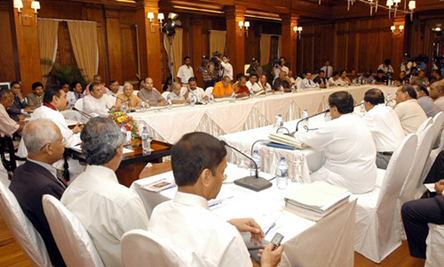The panel of experts appointed by Sri Lankan president Mahinda Rajapakse to submit recommendations regarding power sharing and Constitutional reform has failed to formulate a unanimous report due to deep divisions within it, reports said.
As a result of these divisions amongst the seventeen members, at least four separate preliminary reports had been prepared to be handed over to President Rajapakse Tamilweek.com reported Wednesday.
The expert panel was scheduled to hand over its report to the All Party Representatives Council (APRC) at the Presidential Secretariat in the evening of Dec 6th. President Rajapakse himself was expected to be present but informed sources said he may “miss” the APRC meeting to avoid the embarrassment of receiving four separate reports.
 |
| The All Party Council (pictured in June 2006) has been meeting all year, but has not produced a power-sharing proposal to offer the Tamils. The constitutional experts couldn't agree on either. Photo TamilNet. |
Tamilweek quoted informed sources as saying eleven of the seventeen expert panelists had agreed on a common report though individual members had noted reservations on certain points. This would be presented as the ‘majority’ report.
But the main minority report will be submitted by four other members, all Sinhalese, including the top lawyer and doyen of Sinhala nationalists, H. L. De Silva, PC.
There will also be two dissenting reports presented by two other members, also Sinhalese.
Of the eleven expert panel members who agreed on the minority report six were from the Sinhala community. Four Tamil and the lone Muslim member also signed the ‘majority’ report.
The main issues of contention dividing the majority report and other dissenting reports have been over matters like the extent of devolution and the retaining of points of the 13th Constitutional amendment.
The 13th amendment was brought in 1987 as a result of the Indo – Sri Lanka Accord. The major achievement of that amendment was the introduction of the Provincial Council system and merger of Northern and Eastern Provinces subject to an Eastern referendum.
The dissenting reports are said to be focused more on strengthening the unitary state while the majority report emphasizes a united country with 'maximum devolution,' Tamilweek said.
But even the majority report, a copy of which was obtained and published by Tamilweek.com, avoids saying whether Sri Lanka should be unitary or federal.
President Rajapakse convened an All Party Representatives Conference to make recommendations on Constitutional Reform allowing maximum devolution within a unitary system.
He also appointed an expert panel to formulate Constitutional reform recommendations that were expected be adhered to “mutatis mutandis” by the APRC.
Initially twelve members were appointed to the panel. The membership was later increased to fifteen and subsequently to seventeen.
The four members submitting the minority report are Mr. HL de Silva, Mr. Gomin Dayasiri, Prof GH Peiris and Mr. Manohara de Silva. Mr. KHJ Wijayadasa and Mr. MDD Peiris will submit two other dissenting reports separately.
Ms. Therese Perera, Ms. Malkanthy Wickremasinghe, Dr. Nirmala Chandrahasan, Mr. Asoka Gunawardena, Dr. K. Vigneswaran, Mr. N. Selvakumaran, Dr. Sivaji Felix,Dr. Rohan Perera, Mr. Faiz Mustapha, Dr. Jayampathy Wickramaratne and Mr. RKW Gunasekera agreed on the majority report. Since Dr.Wickremaratne, Dr. Felix and Mr. Asoka Gunaewardene are out of the Country at present their signatures are not on the document but their consent has been duly obtained.
Tamilweek learnt that Dr. Wickremaratne, Mr.RKW Gunasekera, Dr. Rohan Perera and Dr. K. Vigneswaran had expressed reservations on particular matters while agreeing on the whole to the report.
The APRC has representatives from the Sri Lanka Freedom Party , United National Party, Janatha Vimukthi Peramuna , Jathika Hela Urumaya , Sri Lanka Muslim Congress , National Unity Alliance, Ceylon Workers Congress , Mahajana Eksath Peramuna . Lanka Sama Samaja Party , Communist Party of Sri Lanka, All Ceylon Muslim League, Eelam Peoples Democratic Party. National Muslim Congress, Up Country People’s Front and Western Peoples Front.
The Tamil National Alliance (TNA), a coalition of Sri Lanka’s four largest political parties, was not invited to the APRC when it was convened and turned down a belated invitation.
It remains to be seen as to how the APRC will react to the submission of four separate reports and how much of each report will be reflected in the final outcome.
The inability of the Expert panel to finalise a single report evokes memories of the Commission on Devolution appointed by President JR Jayewardene in 1979.
In that instance the majority of members in the Commission headed by Victor Tennekoon submitted one report while the Tamil United Liberation Front (TULF) nominee Dr. Neelan Tiruchelvam presented a dissenting report.
The visible divide in the expert panel also revives memories of the Supreme Court in examining the proposed 13th amendment legislation in 1987. Five Judges voted for and four against in a nine judge bench. All four who voted against were Sinhala while three of those who voted for were members of the Tamil, Muslim and Burgher communities. It was the stance of two Sinhala judges that saw the legislation approved.

